Go Lean Commentary
 ‘Winning and Losing’ is a reality in life …
‘Winning and Losing’ is a reality in life …
… especially true for us in the Caribbean, where losing is a constant feature in our lives; consider:
- We lose 50 percent of our population in some dependent territories – think Puerto Rico, Dutch/French Caribbean, etc.
- We lose 70 percent of our college-educated professionals
- We lose in the battle of Climate Change
- We lose the best students in our schools and then have to be graded on the mediocre remnant
- We lose medical budgets – and associated lives – for medical trauma
- We lose stay-over tourists to cruise liners
- We’ve lost all the colonizing stakeholders – Europeans – to White Flight
It does not have to be this way; there is an attitude – about losing – that seems to be missing here in the Caribbean:
Refuse to lose
This is more that just “3 words strung together”; this is a commitment to quality, success and winning. This is referred to as “community ethos” in the 2013 book Go Lean … Caribbean; see the definition here from Page 20:
The fundamental character or spirit of a culture; the underlying sentiment that informs the beliefs, customs, or practices of a group or society; dominant assumptions of a people or period.
How do we go about fostering this ethos to “refuse to lose”?
One approach is through sports. The field of sports can help to foster the good community ethos to “refuse to lose“. Refuse to Lose is also the title of a book by one of the winningest coaches in College Basketball, John Calipari. See here:
Book Review: Refuse to Lose – Hardcover by John Calipari (Author) – September 17, 1996
“Realistic people place roadblocks in front of themselves,” says John Calipari, “I’m unrealistic in a positive way.” And he gets results. As one of the hottest coaches in college basketball, John Calipari transformed the once-dispirited UMass Minutemen into a #1-ranked force to be reckoned with–taking them to the Final Four for the first time in history. Calipari did more than develop a phenomenal team. He built an outstanding program for success.
What is Calipari’s winning philosophy?
Develop a “Refuse to Lose” attitude.
Though you play to win whatever the score, how you play the game counts. True, you will lose some games, but the way you deal with those losses is part of the attitude of refusing to lose. Calipari’s rules: Stay within the rules. Don’t blame others, take responsibility yourself. Review the tape and learn from it. These are the life skills he taught his players–and they resulted in both professional and personal victory. If you love your kids, Calipari believes, they’ll go through walls for you. Now you can apply these winning strategies to your own life–with your family, your co-workers, and yourself–to any endeavor in which there’s a goal to achieve.The formula works. A man driven by competition and the desire to excel, John Calipari plays to win, rather than playing not to lose. In Refuse to Lose, he insists you step out of your comfort zone. When you’re comfortable, you’re not doing your best. But when you raise the bar above your comfort level, you can accomplish things you never thought possible. He will show you how mistakes can be powerful learning tools and how adversity can become opportunity.
In the bestselling tradition Rick Pitino’s Full Court Pressure and Pat Riley’s The Winner Within, John Calipari tells an amazing story of triumph and grit that is both universal and unique. Powerful, optimistic, and spirited, Refuse to Lose offers a dynamic philosophy that is contagious. Catch it and win!
Source: Retrieved October 12, 2019 from: https://www.amazon.com/Refuse-Lose-John-Calipari/dp/0345408012
——————
Reference: Coach John Calipari
John Vincent Calipari (born February 10, 1959) is an American basketball coach. Since 2009, he has been the head coach of the University of Kentucky men’s team, with whom he won the NCAA Championship in 2012. He has been named Naismith College Coach of the Year three times (in 1996, 2008 and 2015), and was inducted into the Basketball Hall of Fame in 2015.He was previously the head coach at the University of Massachusetts from 1988 to 1996, the NBA‘s New Jersey Nets from 1996 to 1999 and the University of Memphis from 2000 to 2009, and was the head coach of the Dominican Republic national team in 2011 and 2012.
Calipari has coached Kentucky to four Final Fours, in 2011, 2012, 2014 and 2015. He also led UMass and Memphis to the Final Four in 1996 and 2008 respectively … As a college coach, Calipari has twenty-four 20-win seasons, nine 30-win seasons, and three 35-win seasons.
Source: Wikipedia Online encyclopedia; retrieved October 13, 2019 from: https://en.wikipedia.org/wiki/John_Calipari
We need more of this Refuse to Lose ethos in the Caribbean. We are already committed to sports as our Caribbean communities, participate and excel in many sporting endeavors. Plus, most of the Caribbean member-states boast Judeo-Christian principles; alas there is an apropos Bible scripture that adds insight to this discussion (Go Lean book Page 229):
For bodily exercise is profitable for a little … – 1 Timothy 4: 8 (American Standard Version)
We have published a number of previous commentaries reviewing the actuality and historicity of Sports in our region; see a sample list here:
| https://goleancaribbean.com/blog/?p=15664 | Naomi Osaka’s recipe for success: Caribbean Meld |
| https://goleancaribbean.com/blog/?p=14527 | Learning from March Madness (2018) |
| https://goleancaribbean.com/blog/?p=10351 | Lessons from a Winning Team – ‘Culture Eats Strategy For Breakfast’ |
| https://goleancaribbean.com/blog/?p=8272 | The effect of ‘Winning in Sports’ on a Losing Homeland |
| https://goleancaribbean.com/blog/?p=4019 | Learning from the Super Bowl … and its Commercials |
| https://goleancaribbean.com/blog/?p=1341 | Learning from Omaha and the College World Series Time |
| https://goleancaribbean.com/blog/?p=498 | Learning from the ‘Sports Gene’ – Book Review: |
| https://goleancaribbean.com/blog/?p=318 | The urgent need for a Collegiate Sports Eco-system in the Caribbean |
Refusing to Lose is a similar good ethos to the heroic “whatever it takes” attitude. This was detailed in a previous blog-commentary from April 24, 2019:
Way Forward – Whatever it Takes
So for the Caribbean, we need to adopt the required community ethos, drop the bad ethos, execute the strategies, tactics and implementations … to elevate our society. We need to do the heavy-lifting, ‘whatever it takes’; we must succeed.Lives, livelihoods, identities and cultures are at stake.
Refusing to Lose is the opposite of the bad ethos that had been the observed practice for the National Airlines in the Bahamas and other Caribbean member-states. This was detailed in a previous blog-commentary from December 29, 2014:
No Fear of Failure – Case Study: Bahamasair
The story being related in the following [embedded] article is a far cry from a pursuit of quality, in fact the overriding theme is “no fear of failure” on the part of the airline’s stakeholders; “if we succeed or fail, it doesn’t really matter”.
…
This negative community ethos is even enshrined in the regulatory filing for the airline as an international carrier. Appendix B [Industry Quality Standards: Warsaw Convention] highlights the accepted quality standard in aviation known as the Warsaw Convention. Appendix C [Warsaw Convention Exemptions for International Carriers in the US] on the other hand, demonstrates how Bahamasair, and other Caribbean carriers, have petitioned for waivers so as not to abide by these high standards.
This writer got a glimpse of the good “Refuse to Lose” community ethos, just recently, at the 2019 Homecoming Football Game for Florida A & M University (FAMU). Homecoming games, per its namesake, is where the alumni flock back to the Tallahassee campus to celebrate the FAMU experience, culture and societal contributions – addressed in a previous Go Lean commentary. (See the Appendix VIDEO below of a glimpse of the Homecoming Parade).
With the increased attendance and priority, there is no toleration for a lost in the featured football game. The players, coaches and staff … must refuse to lose every year. For 2019, the FAMU Rattlers won; see the news story here:
Title: Rattlers clip the Eagles 28-21 on Homecoming day
By: Rory Sharrock, Tallahassee Democrat
Xavier Smith is the hometown hero for the second consecutive contest at Bragg Memorial Stadium.
The wide receiver followed up his game-winning catch versus Southern on Sept. 21 with a scoring run with 32 seconds remaining to give FAMU a 28-21 triumph over North Carolina Central Saturday on homecoming day.
With the victory, the Rattlers improve to 4-1 and 2-0 in the MEAC. The Eagles fall to 2-4 and 1-1 in league play.
The team’s march to victory began on its 35-yard line with 4:16 on the clock. They picked through the Eagles’ defense with outlet passes and sideline routes.
FAMU quarterback Ryan Stanley tossed three touchdowns to three different receivers.
David Manigo, Marcus Williams and Smith were the recipients of Stanley’s scoring throws.
…
See the full article here: https://www.tallahassee.com/story/sports/college/famu/2019/10/05/quarterly-updates-famu-takes-7-0-lead-over-n-c-central/3879051002/ Posted October 6, 2019; retrieved October 13, 2019.
FAMU Homecoming 2019 was a manifestation of the ethos of Refuse to Lose.
This is why the fostering of sports is so vital for elevating Caribbean society. This is part-and-parcel of the strategies, tactics, implementations and advocacies introduced by the book Go Lean … Caribbean. In fact, “fostering sports” is just 1 of 144 different advocacies presented in the book as a roadmap for the introduction and implementation of the Caribbean Union Trade Federation (CU).
Why is this roadmap so important? It might be the best hope for our Caribbean homeland’s constant ‘losing’.
This roadmap describes the Way Forward, the heavy-lifting for elevating Caribbean society – to turn from losing to winning. Among the 370-pages of the Go Lean book are the turn-by-turn instructions on “how” to adopt many new community ethos. Consider the headlines, summaries and excerpts here on how the region can better foster the Sports eco-system in the Caribbean (Page 229):
10 Ways to Improve Sports
| 1 | Lean-in for the Caribbean Single Market Embrace the advent of the Caribbean Single Market & Economy initiative of the Caribbean Union Trade Federation. This will allow for the unification of the region of 30 member-states into a single market of 42 million people and a GDP exceeding $800 Billion (per 2010). This market size and multi-lingual realities allows for broadcasting rights with SAP-style language options for English, Spanish, French and Dutch. This makes the region attractive for media contracts for broadcast rights, spectrum auctions and sports marketing. The Olympics have demonstrated that sports can be profitable “big business”, and a great source of jobs and economic activity. The CU will copy the Olympic model, and harness the potential in many other sporting endeavors, so as to make the region a better place to live, work and play. |
| 2 | CU Games
Promote the CU Games, every 2 years, as the ascension of the CARIFTA Games for Amateur and now Professional Athletes. The CU Games Administration will also partner with all National Olympic Committees. This administration applies to feeder games, trials and qualification events. The ultimate goal is to field a world-class competitive Olympic Team representing the entire Caribbean. While the CARIFTA Games are for track-and-field events only, the CU Games will resemble a mini-Olympics with multi-sports (boxing, football/soccer, tennis, volleyball, sailing, baseball/softball, etc.). |
| 3 | Fairgrounds as Sport Venues |
| 4 | Regulate Amateur, Professional & Academically-Aligned Leagues |
| 5 | Establish Sports Academies |
| 6 | “Super” Amateur Sport Association
Promote All-Star tournaments (pre-season and post-season) for Amateur (School and Junior) Athletics Associations winners. This includes team sports (soccer, basketball), school sports (track/field) and individual sports (tennis, golf, etc.). |
| 7 | Regulator/Registrar of Scholar-Athletes – Assuage Abandonment |
| 8 | Sports Tourism The CU will promote tournaments and clinics to encourage advancement in certain sports. These tournaments are aimed at the foreign markets (US, Canada, Europe, Central and South America) so as to generate sports-tourism traffic. |
| 9 | Professional Agents and Player Management Oversight (a la Bar/Lawyer Associations) |
| 10 | Impanel the CU Anti-Doping Agency |
So ‘Yes We Can’ …
… Refusing to Lose is a necessary ethos for the Caribbean Way Forward to start winning. We have experienced far too much losing. We can foster the attitudes and opportunities for winning at sports, in life and in society, as individuals and communities..
Let’s all engage, get off the bench and get into the game. We need to win! But first, we need to Refuse to Lose.
This commentary is the start of this series on the Refuse to Lose ethos; this is Part 1-of-6. The full series is cataloged as follows:
- Refuse to Lose: Lesson from Sports
- Refuse to Lose: Remediating ‘Columbus Day’
- Refuse to Lose: Introducing Formal Reconciliations
- Refuse to Lose: Despite American Expansionism
- Refuse to Lose: Canada’s Model of Ascent
- Refuse to Lose: Direct Foreign Investors Wind-Downs
We urged everyone in the Caribbean – leaders and residents, athletic participants and spectators alike – to lean-in to this Go Lean roadmap; to win … at all costs, to make our homeland a better place to live, work and play.
This is not a game for us; this is life. 🙂
About the Book
The book Go Lean…Caribbean serves as a roadmap for the introduction and implementation of the technocratic Caribbean Union Trade Federation (CU), for the elevation of Caribbean society – for all member-states. This CU/Go Lean roadmap has these 3 prime directives:
- Optimization of the economic engines in order to grow the regional economy to $800 Billion and create 2.2 million new jobs.
- Establishment of a security apparatus to ensure public safety and protect the resultant economic engines.
- Improve Caribbean governance to support these engines, including a separation-of-powers between the member-states and CU federal agencies.
The Go Lean book provides 370-pages of turn-by-turn instructions on “how” to adopt new community ethos, plus the strategies, tactics, implementations and advocacies to execute so as to reboot, reform and transform the societal engines of Caribbean society.
Download the free e-Book of Go Lean … Caribbean – now!
Who We Are
The movement behind the Go Lean book – a non-partisan, apolitical, religiously-neutral Community Development Foundation chartered for the purpose of empowering and re-booting economic engines – stresses that reforming and transforming the Caribbean societal engines must be a regional pursuit. This was an early motivation for the roadmap, as pronounced in the opening Declaration of Interdependence (Pages 12 – 14):
xi. Whereas all men are entitled to the benefits of good governance in a free society, “new guards” must be enacted to dissuade the emergence of incompetence, corruption, nepotism and cronyism at the peril of the people’s best interest. The Federation must guarantee the executions of a social contract between government and the governed.
xvi. Whereas security of our homeland is inextricably linked to prosperity of the homeland, the economic and security interest of the region needs to be aligned under the same governance. Since economic crimes … can imperil the functioning of the wheels of commerce for all the citizenry, the accedence of this Federation must equip the security apparatus with the tools and techniques for predictive and proactive interdictions.
xxiv. Whereas a free market economy can be induced and spurred for continuous progress, the Federation must install the controls to better manage aspects of the economy: jobs, inflation, savings rate, investments and other economic principles. Thereby attracting direct foreign investment because of the stability and vibrancy of our economy.
xxxi. Whereas sports have been a source of great pride for the Caribbean region, the economic returns from these ventures have not been evenly distributed as in other societies. The Federation must therefore facilitate the eco-systems and vertical industries of sports as a business, recreation, national pastime and even sports tourism ….
Sign the petition to lean-in for this roadmap for the Caribbean Union Trade Federation.
————–
Appendix VIDEO – Marching 100 perform in Homecoming Parade – https://www.tallahassee.com/videos/news/2019/10/05/watch-marching-100-perform-homecoming-parade/3879408002/
Posted October 5, 2019 – The Marching 100 perform in the 2019 FAMU homecoming parade. By photographer Alicia Devine, Tallahassee Democrat.
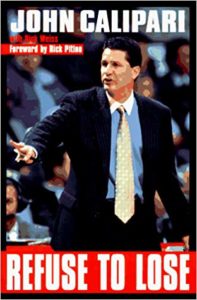
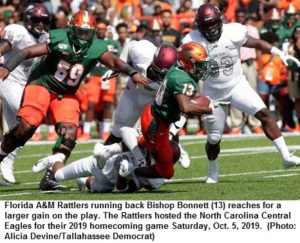





 There are a number of phases of post-Hurricane activities:
There are a number of phases of post-Hurricane activities: A senior official in the administration of President Donald Trump has been quoted by CBS News as saying that the US will not be granting protected status to people fleeing hurricane destruction in Bahamas.
A senior official in the administration of President Donald Trump has been quoted by CBS News as saying that the US will not be granting protected status to people fleeing hurricane destruction in Bahamas. The United States cannot allow China to exploit the recovery and rebuilding of The Bahamas after Hurricane Dorian for its own nefarious purposes and gain “a foothold just 50 miles from the coast of Florida”, U.S. Senator Marco Rubio said on Saturday.
The United States cannot allow China to exploit the recovery and rebuilding of The Bahamas after Hurricane Dorian for its own nefarious purposes and gain “a foothold just 50 miles from the coast of Florida”, U.S. Senator Marco Rubio said on Saturday. HOUSE Speaker Halson Moultrie yesterday recommended to a People’s Republic of China delegation that its country consider developing the southeast region of the Bahamas to shift the population concentration from the northwest Bahamas.
HOUSE Speaker Halson Moultrie yesterday recommended to a People’s Republic of China delegation that its country consider developing the southeast region of the Bahamas to shift the population concentration from the northwest Bahamas.
 … the same playbook of the United States of America in building the world’s largest Single Market economy. (Remember, with the Army Corp of Engineers, the
… the same playbook of the United States of America in building the world’s largest Single Market economy. (Remember, with the Army Corp of Engineers, the 
 Category 5
Category 5 
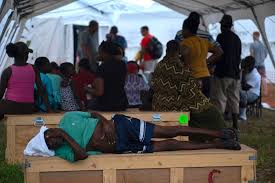
 This we did!
This we did!
 Prefabrication
Prefabrication

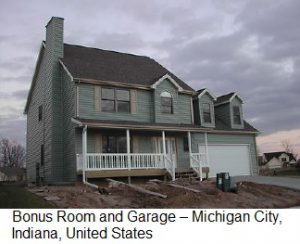

 The Go Lean book stresses that reforming and transforming the Caribbean economic engines must be a regional pursuit. This was an early motivation for the roadmap, as pronounced in the opening Declaration of Interdependence (Pages 12 – 13):
The Go Lean book stresses that reforming and transforming the Caribbean economic engines must be a regional pursuit. This was an early motivation for the roadmap, as pronounced in the opening Declaration of Interdependence (Pages 12 – 13): These Shantytowns are a disaster just waiting to happen… they have been very lucky so far that many persons have not been killed in any of these Shantytown fires. Not to mention the health hazard these places are to the many surrounding residences.
These Shantytowns are a disaster just waiting to happen… they have been very lucky so far that many persons have not been killed in any of these Shantytown fires. Not to mention the health hazard these places are to the many surrounding residences.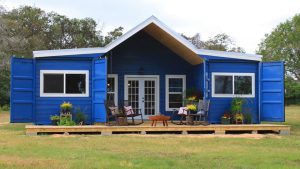 That being said, we should also look at the BIG PICTURE of the immigration dilemma that we are now confronted with. That is the ECONOMIC IMPACT of this ‘vexing’ immigration situation. The old saying: ‘When life gives a ‘lemon’ make lemonade. Can we turn this problem ‘lemon’ into ‘lemonade’?
That being said, we should also look at the BIG PICTURE of the immigration dilemma that we are now confronted with. That is the ECONOMIC IMPACT of this ‘vexing’ immigration situation. The old saying: ‘When life gives a ‘lemon’ make lemonade. Can we turn this problem ‘lemon’ into ‘lemonade’?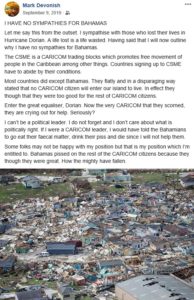
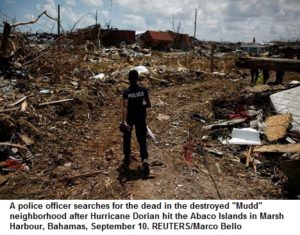
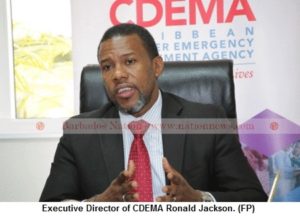
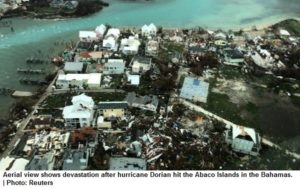







 50 years ago today, in 1969, the legendary Woodstock Music Festival took place in White Lake, New York, USA.
50 years ago today, in 1969, the legendary Woodstock Music Festival took place in White Lake, New York, USA.
 “You must have been absent that day when they gave out brains” – Stinging criticism from a High School Bully.
“You must have been absent that day when they gave out brains” – Stinging criticism from a High School Bully.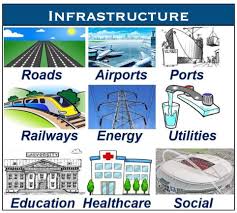 This is What Went Wrong in the Caribbean’s development; we have not always been future-focused. We may have only ever “put out fires”, rather than investing for the long term benefit of future citizens. Think about it:
This is What Went Wrong in the Caribbean’s development; we have not always been future-focused. We may have only ever “put out fires”, rather than investing for the long term benefit of future citizens. Think about it: In this series, reference is made to the need for a comprehensive roadmap for investing in Big Infrastructure projects; one that would elevate the economic engines of Caribbean society, for the full 30 member-states. We are making reference to projects that are too big for any one member-state alone, we would need the whole Caribbean neighborhood, despite the language, race, colonial heritage or political structure. The movement behind the Go Lean book posits that we can confederate and deputize the Infrastructure 101 eco-system for the whole region.
In this series, reference is made to the need for a comprehensive roadmap for investing in Big Infrastructure projects; one that would elevate the economic engines of Caribbean society, for the full 30 member-states. We are making reference to projects that are too big for any one member-state alone, we would need the whole Caribbean neighborhood, despite the language, race, colonial heritage or political structure. The movement behind the Go Lean book posits that we can confederate and deputize the Infrastructure 101 eco-system for the whole region.

 Be our guest
Be our guest Now the primary economic driver in the region – every member-state – is tourism. We are still in the Life of Leisure business. Except now, instead of a Life of Leisure it is now only a week of leisure, or a forth-night, or a month, or a season (i.e. Winter Snowbirds). We have replaced one master for multiple masters at the resort properties; “one master at a time” still enjoys the leisure.
Now the primary economic driver in the region – every member-state – is tourism. We are still in the Life of Leisure business. Except now, instead of a Life of Leisure it is now only a week of leisure, or a forth-night, or a month, or a season (i.e. Winter Snowbirds). We have replaced one master for multiple masters at the resort properties; “one master at a time” still enjoys the leisure. … assigning the term “Dragon” to a “Dependence on Foreign Investors” or DFI. …
… assigning the term “Dragon” to a “Dependence on Foreign Investors” or DFI. …
 Now the focus must be on the changes that we need to move forward – the
Now the focus must be on the changes that we need to move forward – the  Yes, this is a thing; “Moonshots” that is. This is defined as follows:
Yes, this is a thing; “Moonshots” that is. This is defined as follows:
 Yes, we can … in the Caribbean conceive, believe and achieve our own “Moonshots”. What is it that we want? Not much … just everything that should be accomplished and pursued by a matured democratic society; think:
Yes, we can … in the Caribbean conceive, believe and achieve our own “Moonshots”. What is it that we want? Not much … just everything that should be accomplished and pursued by a matured democratic society; think: